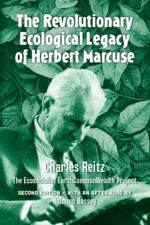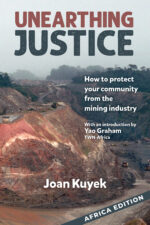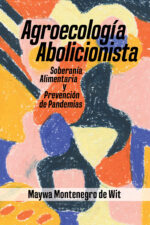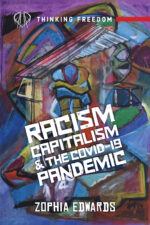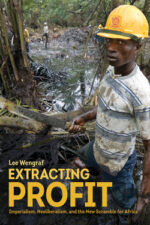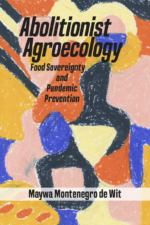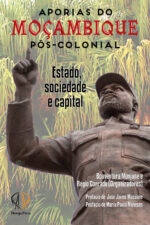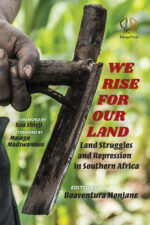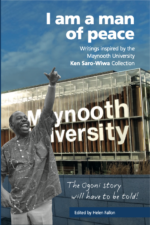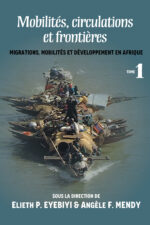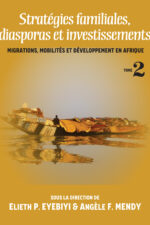-
Agroecología Abolicionista, Soberanía Alimentaria y Prevención de Pandemias
Un sistema alimentario agroecológico no consiste más acerca de alimentos orgánicos que la abolición se refiere a abrir la puerta de una prisión. En este ensayo vital, Maywa Montenegro de Wit entrelaza ideas provenientes de las literaturas políticas y ecológicas más importantes de finales del siglo XX y comienzos del XXI. La pandemia proporciona un foco para estas dos fuentes de iluminación, pero la luz brillante que proviene de unir estas disciplinas brillará mucho después de que pase la sombra de la Covid-19. —Raj Patel, autor de Stuffed and Starved [Relleno y famélico].
El folleto resuena con la pregunta: ¿reforma o transformación? Pregunta: ¿mitigaremos y adaptaremos o revisaremos y cambiaremos nuestros imaginarios? Se nos ha dado un andamio para abordar el bastión del colonialismo y la colonialidad y para reconstruir los sistemas que ya han empujado su rodilla sobre los sistemas alimentarios y socioeconómicos que ya se estaban sofocando. Es hora de librarse de una pesadilla construida deliberadamente. – Nnimmo Bassey, autor de To Cook a Continent: Destructive Extraction and the Climate Crisis in Africa [El cocinar un Continente: Extracción Destructiva y Crisis Climática en África] y fundador de Health of Mother Earth Foundation [Fundación Salud de la Madre Tierra].
La COVID-19 y otros brotes zoonóticos como el ébola son ilustrativos de las complejas interacciones entre la deforestación, la pérdida de biodiversidad, la destrucción del ecosistema y la salud y seguridad humanas. Estos cambios son impulsados principalmente por la agricultura industrial y el sistema alimentario globalizados, respaldados por el ilógico y destructivo capitalismo racial. … Montenegro de Wit presenta argumentos convincentes a favor de cambios hacia sistemas agroecológicos diversificados que reconozcan las complejas interconexiones entre la salud humana y animal, entre las plantas y nuestro medio ambiente y futuro compartidos. De hecho, abordar las pandemias de manera sistémica no puede desvincularse de la construcción de economías y sistemas alimentarios que se basan en las necesidades de las personas, en particular de los pequeños agricultores, y de los ecosistemas prósperos. Para lograrlo, debemos rechazar y prohibir rotundamente la ecocida ilógica de la mercantilización, la financialización y el extractivismo, como fuerzas impulsoras de las fortunas y los destinos humanos y ecológicos. … El fortalecimiento de los movimientos sociales a nivel local es indispensable para forzar la ruta de África hacia un liderazgo político eficaz y democrático. Se necesita una clara ruptura, dejando atrás intervenciones a favor de un desarrollo ahistórico y tecnicista, donde la tecnología y la productividad se plantean como problemas y soluciones, hacia un replanteamiento urgente y drástico para hacer frente a las crisis sistémicas convergentes que enfrentamos hoy.
– Mariam Mayet, directora ejecutiva del African Centre for Biodiversity [Centro Africano para la Biodiversidad]
COVID-19 ha expuesto la naturaleza racializada de los sistemas alimentarios, pero también potencialmente otorga oportunidades para construir de nuevo. Maywa Montenegro explora una serie de averías, desde cadenas de suministro fracturadas hasta infecciones incontroladas entre trabajadores de alimentos esenciales, entre comunidades negras, marrones e indígenas atravesadas por el virus a lo largo de viejos surcos de opresión racial y de clase.
Ella rastrea los orígenes probables de COVID-19 a los sitios de derrame forjados por la expansión agroindustrial en regiones boscosas donde los patógenos brotan libres e infectan a los humanos. La agricultura animal industrial impulsa estos cambios ecológicos que incuban futuros brotes. Las pandemias tienen sus raíces en la separación violenta de las comunidades de sus territorios, semillas, conocimiento y riqueza. El racismo permite tal robo como fundamental para la expansión capitalista.
Para hacer frente a las pandemias y las injusticias alimentarias, Montenegro pide una agroecología abolicionista. Ninguna alternativa anticapitalista puede ignorar el racismo que es central para el sistema alimentario transnacional. Académicos como Angela Davis, Ruth Wilson Gilmore y Mariame Kaba han argumentado que aunque la abolición se ve con frecuencia como una estrategia de oposición, para erradicar, por ejemplo, las prisiones y la policía, la abolición es igualmente proposicional. Una agroecología abolicionista abre múltiples posibilidades que responden a las exigencias de un planeta pandémico: no hay una “normalidad” a la que podamos regresar con seguridad.
Esta es una traducción al español de Abolitionist Agroecology, Food Sovereignty and Pandemic Prevention
-
Racism, Capitalism, and COVID-19 Pandemic
The COVID-19 pandemic has brought into sharp relief the deep structural problems affecting nonwhite racialized workers in the core and periphery. Yet, many social scientific analyses of the global political economy, at least in the pre-COVID era, are race neutral or willfully indifferent to the persistent racial pattern of global inequalities. This piece seeks to understand how the unremitting super-exploitation of Black and other nonwhite racialized labor in the core and the periphery persisted throughout the COVID-19 crisis through the lens of Black radical scholarship on racism and capitalism. It historicizes the pandemic within the long arc of racist capitalist labor super-exploitation at the birth of capitalism and in its subsequent unfolding. It also shows the mechanisms by which COVID-19 has exacerbated the already existing, structural racial and colonial inequalities that undergird the global economy. White capital and European and North American states have deemed Black and other nonwhite racialized labor “essential” to maintaining profits and called upon these workers both within North America and Europe and in the global periphery to ensure continued production and profits in almost every realm. These workers were seen as essential but expendable; compelling them to continue laboring during the deadly pandemic increased the precarity and danger they faced and exacerbated racial and economic inequalities both within and between countries. At the same time, neoliberal racist states are further marginalizing these very workers by excluding them from much needed social protections to cope with the impacts of COVID-19 on their health, income, and overall well-being. The piece also illuminates why, despite the dire social and economic conditions threatening the lives and livelihoods of workers writ large, white workers continue to refuse to join a multiracial antiracist movement for liberation from imperial and racial capitalist exploitation. The author ends by reflecting on what it means to “return to normal” within the architecture of racial capitalism and the pursuit of a different path to justice and freedom.
See also our interview with Zophia Edwards and David Austin.
-
Abolitionist Agroecology, Food Sovereignty and Pandemic Prevention
COVID-19 has exposed the racialized nature of food systems, but also potentially grants opportunities to build anew. Maywa Montenegro explores a series of breakdowns, from fractured supply chains to uncontrolled infection among essential food workers, among Black, Brown, and Indigenous communities scythed through by the virus along old grooves of race and class oppression.
She traces the likely origins of COVID-19 to spillover sites forged by agroindustrial expansion into forested regions where pathogens spring free and infect humans. Industrial animal agriculture drives these ecological changes that incubate future outbreaks. Pandemics have their roots in the violent separation of communities from their territories, seeds, knowledge and wealth. Racism enables such theft as fundamental to capitalist expansion.
To tackle pandemics and food injustices, Montenegro calls for an abolitionist agroecology. No anti-capitalist alternative can ignore the racism that is central to transnational food system. Scholars including Angela Davis, Ruth Wilson Gilmore, and Mariame Kaba have argued that although abolition is frequently seen as an oppositional strategy — to eradicate, for example, prisons and police — abolition is equally propositional. An abolitionist agroecology cracks open multiple possibilities that respond to the exigencies of a pandemic planet — there is no ‘normal’ to which we can safely return.
-
I am a man of peace: Writings inspired by the Maynooth University Ken Saro-Wiwa Collection
This book marks the 25th anniversary of the execution of Nigerian activist and written Ken Saro-Wiwa. The 21 essays, by international contributors, and 42 poems by new and established poets, are inspired by his ideals and activism.
The volume includes contributions by people intimately connected with Saro-Wiwa. His brother Dr Owens Wiwa recounts how his older brother awakened and nurtured his awareness of the tremendous damage Royal Dutch Shell was doing to their homeland, in collaboration with the then Nigerian military government. His firsthand account of the brutality of the military government and its impact; his unsuccessful efforts to save the life of his brother; his time in hiding and subsequent escape, with his family, from Nigeria and his efforts to retrieve the remains of his brother for burial, makes for very moving reading. Likewise, Noo Saro-Wiwa shares her story of growing up in England with strong links to family in Nigeria, and the trauma of hearing of her father’s execution while at University.
Maynooth University, where the editor works as Deputy Librarian, holds the death row correspondence from Ken Saro-Wiwa to Sister Majella McCarron. McCarron provides two personal essays. One, a reflection on the events that shaped her work with Saro-Wiwa in Nigeria and her subsequent efforts to save the lives of the Ogoni 9: the second essay explores her experience as a table observer of the Shell to Sea campaign, which strove to have gas, discovered off the west coast of Ireland, refined at sea rather than inland.
The damage that Shell has caused in Ogoni and the issue of redress are topics addressed in essays by experts including Mark Dummett, of Amnesty International, who investigated how Shell and other oil companies have caused or contributed to human rights abuses through their operations in the Niger Delta. Daniel Leader, a barrister and partner at Leigh Day’s international law department, the firm who have led a number of ground breaking human rights cases, including a series of cases against Shell on behalf of Nigerian communities, explores the issue of legal redress. Architect, environmental activist, author and poet Nnimmo Bassesy’s wide ranging essay presents Saro-Wiwa as activist and writer and creator of the Ogoni Bill of Rights, against the backdrop of the UNEP report of the Environmental Assessment of Ogoniland, which recorded that drinking water in Ogoni had benzene, a carcinogen, at over 900 times the level permitted
I welcome the publication of this volume which highlights the work of Trócaire and other people and organisations
to fight for a more just world. Trócaire campaigned strongly for the release of the Ogoni 9 and continues to campaign for justice in the face of state and corporate violations of human rights. The writings of Ken Saro-Wiwa and those inspired by his work keep the flame of justice lit.Dr Caoimhe De Barra, Chief Executive Officer, Trócaire.
The publication of I am a Man of Peace: Writings Inspired by the Maynooth University Ken Saro-Wiwa Collection highlights the shift towards peaceful protests as a means to a more sustainable end. It is a justification that one’s dreams for the greater good can still be attained without bloodshed. Ken preached, lived, and practiced peace in his search for justice even in the face of stiff opposition. Years after his death, Ken’s ideologies and philosophies have proved relevant today.
Dr Owens Wiwa, Executive Vice-President, Clinton Health Access Initiative (CHAI).
Sister Majella McCarron’s choice of Maynooth University for this unique donation was particularly appropriate, given the University’s long involvement with issues of inclusion and justice in Ireland and abroad. This deep-rooted commitment is today articulated in our University Strategic Plan, where a strategic goal is ‘to build on our achievements to date and become a model University for equality, diversity, inclusion and inter-culturalism, where social justice, addressing inequality and empowering people are central to our mission.’ This book makes a significant contribution to that goal.
Dr. Gemma Irvine, Vice-President of Equality & Diversity, Maynooth University.
Writing can urge us to pause, to think, and to discover what we really want to say. Sharing that writing calls for courage and support. In this publication, as Jessica Traynor suggests, we see the evidence of a new generation of Irish and new Irish citizens engaging with complex issues through poetry. Reading their poems, we may begin to understand more about each other and ourselves. By bringing together these Irish and new Irish voices the book contributes to building a shared discourse which is essential for trust, community and hope.
Dr Alison Farrell, Founder of the Summer Writing Institute For Teachers (SWIFT) and Co-founder Irish Network for the Enhancement of Writing (INEW)
-
Silence Would Be Treason: Last writings of Ken Saro-Wiwa (Expanded 2nd Edition)
Edited by Íde Corley, Helen Fallon, Laurence Cox
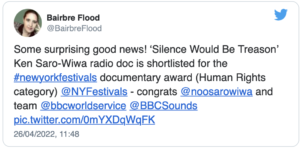
Recent tweet about good news of the radio documentary on Silence Would Be Treason being shortlisted for the #newyorkfestivals documentary award (Human Rights category). Congrats to @noosarowiwa et al. These letters and poems are invaluable fragments of a living conversation that portrays the indomitable power in humans to stay alive in the face of certain death – to stay alive even in death.
Reading through the treasure trove of the letters and poems compiled here as The Last Writings of Ken Saro-Wiwa evokes intense memories of his resolute struggles against an oil behemoth and a deaf autocratic government. His crusade frames one of the most tumultuous periods of Nigeria’s history; his tragic story evokes anger and demands action to resolve the crises that first led the Ogoni people to demand that Shell clean up Ogoni lands or clear out of the territory.
I
-
Cradles
Valiani has written a beautiful and insightful book of poetry about the birthplace of humanity; ‘the cradle of civilization’, Africa. The poems are gathered into four sections: “Womb”; “Land(s)”; “Tides”; “Wind”. Each section is prefaced by philosophy, findings and artifacts of “Maropeng” which becomes both subject and predicate for this soothing poetry: a lullaby for the soul’s remembering. Candice James Poet Laureate Emerita of New Westminster
Cradles is a collection poems on the nature(s) and nurturing that cradle us. They are divided into four parts: Womb is the first cradle, both ‘nature’ and ‘nurture’, under-acknowledged and often unmentioned. Beyond the physical womb of individuals, there are collective wombs that incubate on yet grander and greater scales. Land(s) are the cradles we typically identify as our ‘origins’, but as the Cradle of Humankind teaches, the many lands of today are interlaced in many concealed ways and originated in a single, little understood place. Tides are the many migrations and cycles of time that shape us. They can shift, upset and remake the nurturing of cradles; but also cradle us in cycles of wreckage. Wind sets us free of places and times of origin. This detachment can bring freedom, a sense of loss/lostness, and the many things in between. The freedom/loss/lostness spiral whirls with the wind and transforms. In surrendering to it we can alter its pace to our needs and desires.

